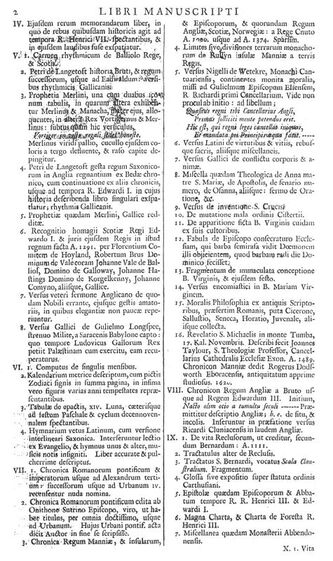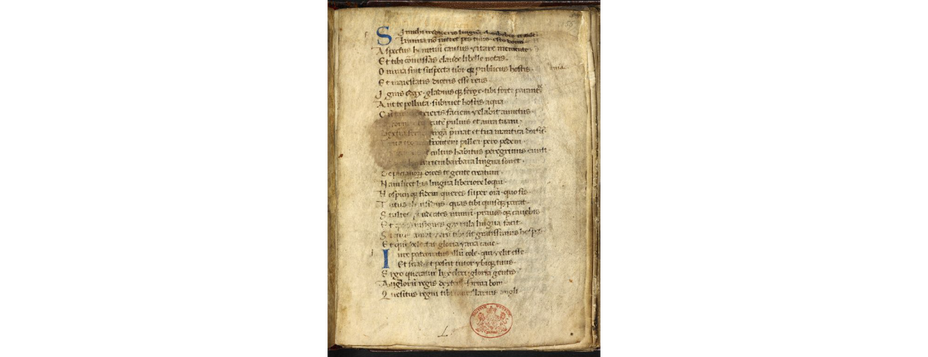
Authority Cited: Nigel de Wetekre
Author name and dates: Nigel Wireker or Nigel de Longchamps (c.1130- c.1200) or, per the DNB, Wetekre (BL, Cotton MS Julius A.vii)
BKG Wetekre Bio-tweet: Canterbury monk, poet; quoted by Chaucer; SJ quotes supposed L. verses to Bishop of Ely (Longchamp), chancellor to Richard I
Author name and dates: John of Salisbury (c.1120-1180)
BKG John of Salisbury Bio-tweet: Anglo-Saxon clerk; self-described: short; studied in Paris under Abelard; wrote on classics education, medicine, ethics
Categories (list of works cited – preliminary) [BKG Note: one Nigel de Wetekre cite in 1755 Dict. vol. 1. No Nigel de Wetekre cites were identified as added in the 1773 Dict. Per A. Boutemy in Nigellus de Longchamp dit Wireker, 1959, Presses Universitaries de France, 108, Boulevard Saint-Germain, Paris-VIe, p.131, the poem SJ cites was misidentified as Wireker in the British Museum, "Collection Cotton, MS Julius A.vii, fol. 58 a 63 (ne renferme que le poeme, a la suite de l'introductin en vers du Policraticus)" (contains only the poem, the introduction in verse of the Policraticus). The Policraticus is by John of Salisbury. My initial guess was that the Dict. quotation was derived from this manuscript. Boutemy indicates that the BM Collection Cotton Cleopatra B iii ff. 112r.-133v. manuscript has the Wireker poem from Tractatus. (This manuscript has not been digitized or catalogued in detail by the BL. The entry in the 1696 Cottonian catalogue is Cleopatra B III. 6. on p. 137 is Tractatus ejusdem ad Willielmum Episcopum Eliensem, Angliae Cancellarium in quo in vehitur in coruptos sectili mores, & in speciatum in Curiales & Officiales Clericos.) Boutemy also lists other Wireker manuscript sources but indicates that they are only prose material. In 1753, the Cotton library formed one of the foundation collections of the newly-established British Museum. With the assistance of the British Library, a better catalogue description appears to be:
Cotton MS Julius A VII, ff 55–65: John of Salisbury, Entheticus in Policraticum (ff. 55r–60v: Walther 17789); Nigel Witeker, Contra curiales et officiales clericos (ff. 60v–65r: verse, Walther 14366): 2nd half of the 15th century; Latin; origin Italy; owned by Sir Robert Cotton (d. 1631).
If this is the manuscript was the source of the 1755 Dict. quotation, the adjacent location of the two poems may explain the incorrect Dict. attribution. However, since vol. 1 of the 1755 Dict. was in the press by 1754, it seems unlikely that SJ would have seen this copy of the manuscript. As f. 60v appears to contain both the end of the John of Salisbury poem and the beginning of the Wireker Tractatus poem, that page and the final page of the poem were examined, but do not indicate a Wireker attribution. R. DeMaria points out the 1755 Dict. quotation for the headword chancellor appears in the 1696 Catalogue of the Cottonian Library on p. 2 (Julius A. VII. 5., attributed to Wetekre). I conclude that the misidentification was by the cataloguer, Thomas Smith, or the manuscript catalogue from which Smith worked, and that the 1696 catalogue was the Dict. source for the quotation, and also the variant spelling of Wetekre.]
Catalogus librorum manuscriptorum Bibliothecæ Cottonianæ cui præmittuntur illustris viri, D. Roberti Cottoni, equitis aurati & baronetti, vita : et Bibliothecæ Cottonianæ historia & synopsis, scriptore Thoma Smitho, Ecclesiae Anglicani Presbytero, 1696, Oxford: E Theatro Sheldoniano
Primus solliciti mente petendus erit.
Hic est, qui regni leges cancellat iniquas,
Et mandata pii principis æqua facit. Verses of Nigel de Wetekre to the bishop of Ely, chancellor to Richard I."
[BKG Note: these are precisely lines 27-30 of the Ioannes Saresberiensis (John of Salisbury) Policraticus verse introduction (Entheticus) in:
Policratici sive De nugis curialium et vestigiis philosophorum libri VIII Liber quartus, Bibliotheca Augustana. The last line of f. 55r in the British Library image below is the first line of the 1755 Dict. quotation. The Smith 1696 catalogue also has directions on where to find the quotation: "vide non proculab ab initio: ad libelllum" (see not far from the beginning: to the little book)]
Thanks to Emeritus Prof. Barry Baldwin for locating the quoted text in Bibliotheca Augustana as John of Salisbury and suggesting the following translation:
The chancellor of the English kingdom was approached by you,
He will be the first to be approached with concerned mind.
This is he who cancels the unjust laws of the kingdom,
And he makes the commands of the pious prince equal (BKG Note: equitable?).
(A somewhat different translation is suggested by n.15, p.277 of R. DeMaria's Johnson's Dictionary and the Language of Learning.)
Si stes, stabis ei, si forte cadis, cadis illi;
Seu stes, sive cadas, non minus ejus eris.
Si non cancellat te cancellarious, immo
Approbat, ulterius irreprobatus eris.
Google translation:
If you stand, you will stand for him, if you happen to fall, you fall for him;
Whether you stand or fall, you will be no less his.
If the chancellor does not cancel you, but rather
Approves, you will be further disapproved.
The context of the Wireker poem is said to be the conflict of interest created by the Chancellor being also the Bishop.
Author name and dates: Nigel Wireker or Nigel de Longchamps (c.1130- c.1200) or, per the DNB, Wetekre (BL, Cotton MS Julius A.vii)
BKG Wetekre Bio-tweet: Canterbury monk, poet; quoted by Chaucer; SJ quotes supposed L. verses to Bishop of Ely (Longchamp), chancellor to Richard I
Author name and dates: John of Salisbury (c.1120-1180)
BKG John of Salisbury Bio-tweet: Anglo-Saxon clerk; self-described: short; studied in Paris under Abelard; wrote on classics education, medicine, ethics
Categories (list of works cited – preliminary) [BKG Note: one Nigel de Wetekre cite in 1755 Dict. vol. 1. No Nigel de Wetekre cites were identified as added in the 1773 Dict. Per A. Boutemy in Nigellus de Longchamp dit Wireker, 1959, Presses Universitaries de France, 108, Boulevard Saint-Germain, Paris-VIe, p.131, the poem SJ cites was misidentified as Wireker in the British Museum, "Collection Cotton, MS Julius A.vii, fol. 58 a 63 (ne renferme que le poeme, a la suite de l'introductin en vers du Policraticus)" (contains only the poem, the introduction in verse of the Policraticus). The Policraticus is by John of Salisbury. My initial guess was that the Dict. quotation was derived from this manuscript. Boutemy indicates that the BM Collection Cotton Cleopatra B iii ff. 112r.-133v. manuscript has the Wireker poem from Tractatus. (This manuscript has not been digitized or catalogued in detail by the BL. The entry in the 1696 Cottonian catalogue is Cleopatra B III. 6. on p. 137 is Tractatus ejusdem ad Willielmum Episcopum Eliensem, Angliae Cancellarium in quo in vehitur in coruptos sectili mores, & in speciatum in Curiales & Officiales Clericos.) Boutemy also lists other Wireker manuscript sources but indicates that they are only prose material. In 1753, the Cotton library formed one of the foundation collections of the newly-established British Museum. With the assistance of the British Library, a better catalogue description appears to be:
Cotton MS Julius A VII, ff 55–65: John of Salisbury, Entheticus in Policraticum (ff. 55r–60v: Walther 17789); Nigel Witeker, Contra curiales et officiales clericos (ff. 60v–65r: verse, Walther 14366): 2nd half of the 15th century; Latin; origin Italy; owned by Sir Robert Cotton (d. 1631).
If this is the manuscript was the source of the 1755 Dict. quotation, the adjacent location of the two poems may explain the incorrect Dict. attribution. However, since vol. 1 of the 1755 Dict. was in the press by 1754, it seems unlikely that SJ would have seen this copy of the manuscript. As f. 60v appears to contain both the end of the John of Salisbury poem and the beginning of the Wireker Tractatus poem, that page and the final page of the poem were examined, but do not indicate a Wireker attribution. R. DeMaria points out the 1755 Dict. quotation for the headword chancellor appears in the 1696 Catalogue of the Cottonian Library on p. 2 (Julius A. VII. 5., attributed to Wetekre). I conclude that the misidentification was by the cataloguer, Thomas Smith, or the manuscript catalogue from which Smith worked, and that the 1696 catalogue was the Dict. source for the quotation, and also the variant spelling of Wetekre.]
Catalogus librorum manuscriptorum Bibliothecæ Cottonianæ cui præmittuntur illustris viri, D. Roberti Cottoni, equitis aurati & baronetti, vita : et Bibliothecæ Cottonianæ historia & synopsis, scriptore Thoma Smitho, Ecclesiae Anglicani Presbytero, 1696, Oxford: E Theatro Sheldoniano
- Nigel de Wetekre (no work cited); chancellor
Primus solliciti mente petendus erit.
Hic est, qui regni leges cancellat iniquas,
Et mandata pii principis æqua facit. Verses of Nigel de Wetekre to the bishop of Ely, chancellor to Richard I."
[BKG Note: these are precisely lines 27-30 of the Ioannes Saresberiensis (John of Salisbury) Policraticus verse introduction (Entheticus) in:
Policratici sive De nugis curialium et vestigiis philosophorum libri VIII Liber quartus, Bibliotheca Augustana. The last line of f. 55r in the British Library image below is the first line of the 1755 Dict. quotation. The Smith 1696 catalogue also has directions on where to find the quotation: "vide non proculab ab initio: ad libelllum" (see not far from the beginning: to the little book)]
Thanks to Emeritus Prof. Barry Baldwin for locating the quoted text in Bibliotheca Augustana as John of Salisbury and suggesting the following translation:
The chancellor of the English kingdom was approached by you,
He will be the first to be approached with concerned mind.
This is he who cancels the unjust laws of the kingdom,
And he makes the commands of the pious prince equal (BKG Note: equitable?).
(A somewhat different translation is suggested by n.15, p.277 of R. DeMaria's Johnson's Dictionary and the Language of Learning.)
- Tractatus contra Curial contra Curiales et Officinales Clericos
Si stes, stabis ei, si forte cadis, cadis illi;
Seu stes, sive cadas, non minus ejus eris.
Si non cancellat te cancellarious, immo
Approbat, ulterius irreprobatus eris.
Google translation:
If you stand, you will stand for him, if you happen to fall, you fall for him;
Whether you stand or fall, you will be no less his.
If the chancellor does not cancel you, but rather
Approves, you will be further disapproved.
The context of the Wireker poem is said to be the conflict of interest created by the Chancellor being also the Bishop.
